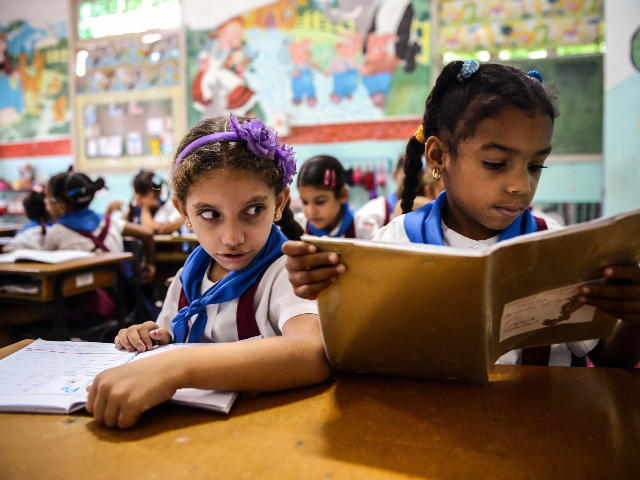The Cuban Communist Party has not planned any social isolation measures, including shutting down schools, to combat a growing number of Chinese coronavirus cases – alarming parents worried they do not even have enough water or soap to wash their hands, Cuban outlets revealed on Wednesday.
Cuba has confirmed ten cases of coronavirus in the country and one death, a 61-year-old Italian tourist, according to the independent outlet 14 y medio. To the extent the identities of those remaining alive have been made public, they mostly appear to be Italian and Spanish tourists. The Cuban citizens identified work in the hospitality industry. The Castro regime is isolating another 389 people identified as being exposed to confirmed coronavirus patients and “monitoring” a total of over 24,000 people for symptoms.
While Cuba has signed onto China’s Belt and Road Initiative (BRI) – its plan to dominate global transportation infrastructure, which requires large influxes of Chinese workers into participating countries – the Castro regime has not traced any of its confirmed cases back to China.
Experts have confirmed the Chinese coronavirus originated in Wuhan, central China, in November. The Chinese Foreign Ministry has falsely described it as an American bioweapon developed in Maryland, a claim Havana has promoted.
Havana has refused to halt flights from Europe, China, or other affected areas and Cuba’s Ministry of Tourism (MINTUR) has continued to encourage travelers to flock to Cuba. The lack of measures to protect the Cuban population have prompted alarm among the island’s residents. Also outraging parents were requests from their local schools urging parents to contribute hand soap, chlorine, and face masks from their homes.
“There is no soap in my house to guarantee the necessary hygienic-sanitary measures, now tell me how am I going to find soap to send to the school?” one parent, Jéssica Miranda, told the independent outlet Cubanet. “They asked us parents to bring everything: masks, chlorine, soap, even water. Five masks because they have to be changed every two hours, and I can’t even find one.”
“I don’t want to send my child to school,” another mother, Haydée Hidalgo, told Cubanet. “I am waiting for my aunt to make some masks out of cloth, because we don’t have any other choice. The authorities ask for a lot and haven’t informed us what places have masks, soap, chlorine. I am panicked because it seems like the government doesn’t care if the virus spreads.”
“Teachers are saying the children should not be in crowded places, so how do you explain that they don’t suspend classes, since that is where students, teachers, parents, and other congregate?” yet another mother, Arianna Ávila, asked. “I can’t make heads or tails of it.”
An unidentified mother similarly complained about school openings to 14 y medio, insisting she would not send her children to school.
“Until we know for sure what is going on, I am not bringing my boy anymore,” the mother said. “I see that in a lot of countries, among the first things done is the closure of schools and here, where there isn’t even water to wash our hands, we keep ours open. Stubborn.”
As taking children out of school in Cuba – where the government indoctrinates them with communist propaganda – is a highly punished crime, the mother said she told her son’s teacher that they had family visiting from abroad and were taking a vacation.
Another anonymous mother speaking to the outlet made a similar complaint: that they have no access to soap and water and cannot understand why schools are open.
“There isn’t any water here, much less soap, which are the basics to stay clean. The teacher waits for them every morning with a little bottle of water and chlorine to use on each child’s hands. Those are the measures being taken up to now,” the mother explained. “They have also not suspended any late or extracurricular activities.”
As recently as Monday, the Cuban Tourism Ministry was attempting to attract foreign arrivals to the island. The Castro regime controls all tourism and keeps all profits from the industry on the island, one of its few reliable means of funding outside of receiving money from fellow communist countries such as China. The governor of Matanzas province, in central Cuba, urged tourists to come to its famed Varadero beach because “it is a competent destination to prevent the COVID-19 [Chinese coronavirus] pandemic.” Matanzas, he noted, had not reported any coronavirus cases.
MINTUR, the tourism ministry, announced the day before that Cuba “continues to receive visitors” and alleged that “some tourists have expressed their preference to spend the time of the epidemic in Cuba, where they will be safer and better attended to than in their own countries.”
Cuba has one of the world’s worst and most deteriorated healthcare systems. While the Castro regime maintains a few facilities to impress tourists, in July 2019, medical officials on the island who handle Cuban patients sounded the alarm on severe medical shortages at Cuban hospitals.
“It is very lamentable to see people lying down in the pharmacy, on cardboard, to see if a shipment of their medicine is coming the next day, because when it does arrive there isn’t enough for everyone,” Joel Espinosa Medrano, a resident of Santa Clara, Cuba, told Martí Noticias last year, describing his usual pharmacy runs for basic medicines. “Many times, they spend the night there and get their medicine the next day.”
Cuban-Americans and human rights advocates in the United States have encouraged President Donald Trump to cancel flights between America and Cuba to keep the coronavirus outbreak in America from getting worse, given Havana’s reluctance to limit foreigners from entering the country and its weakened healthcare system.

COMMENTS
Please let us know if you're having issues with commenting.